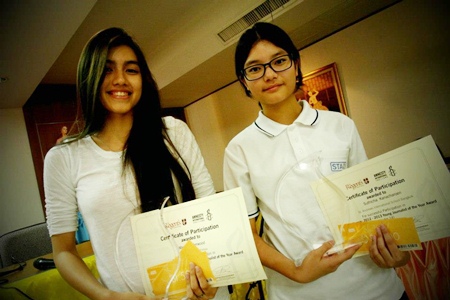The Regent’s School Pattaya and Amnesty International Thailand have just announced the results of the inaugural Young Journalist of the Year Thailand awards. Several thousand students from 20 international schools took part in the competition organized by Andrew Chambers of The Regent’s School Pattaya, and the charity – they had to write a 500 word article on a human rights topic such as the death penalty or migrant workers.
The judges included Pravit Rojanaphruk – Columnist with The Nation (English daily in Thailand) and Dr. Varaporn Chamsanit – a university professor of Human Rights. Thai PBS (Thai Public Broadcasting Corporation) also were involved with interviewing the finalists.
 The two winners – Mae and Suthicha.
The two winners – Mae and Suthicha.
The winner in the U14 category was Suthicha Kanacharoen from St Andrews School Bangkok for her piece on the Rohingyan Muslims in Burma and the winner in the U18 category was Mae Underwood from The Regent’s School Pattaya for her piece on refugees and migrants in Mae Sot.
Below is Mae’s winning piece and her reflection that followed.
The Winning Article: Migrant Workers in Thailand
By Chuliporn (Mae) Underwood The Regent’s School Pattaya
According to the International Organization of Migration, an estimated 2.5 billion migrant workers in Thailand were recorded in 2012, with about 300,000 of them being children. Every year thousands more from Burma, Cambodia and Laos seek asylum in Thailand from political and economical repression. Yet those who are able to complete the protracted administration process for refugee camps are a minority. Many live outside these camps and are thus regarded as ‘illegal migrants, being subject to arrest, detention and deportation under immigration law’, states the United Nations High Commissioner for Refugees.
Being illegal, many are subject to trafficking, child labor and other forms of exploitation. They are often trafficked or forced into labor by unlawful recruiting agencies. Both adult and child migrants are coaxed into accepting ‘a decent job opportunity,’ but end up stranded in isolated areas, prohibited to leave.
Lewis Underwood, Chairman of the Jesters Care for Kids Charity Drive, writes in the Pattaya Mail: “Desperate children, especially pre-teens, are at most risk without adult protection.” Many children become victims to the severity of the fishing industry, he claims, where they are forced to work on fishing boats under prison-like conditions.
Half of laborers in the Thai fishing industry are Burmese, adds Time Magazine reporter, Jesse Hardman. They are abused by their employer, and those who seek help from police are either returned to Burma or sold back to their employers. A Burmese migrant worker reports: ‘We have to work 11 hours a day, and we get 1 day off a month’ – they also make less than $2 (60 baht) a day, Jesse states.
What can be done to help these families? Experts believe education is the most effective solution. By reducing the vulnerability of these refugees, the root of the problem is directly addressed. However, availability and quality of education continues to be a challenge for Thailand, more so for migrant children. Many emigrant families struggle to send their children to school, mainly because they live in extreme poverty. Migrant workers are paid much less than the minimum wage of Thais, so rarely are these families able to afford education.
On the other hand, education is gradually becoming more available for both documented and undocumented migrant children in Thailand. By 2005, all migrant children were legally allowed to attend public schools, in addition to participating in educational programs established by non-government organizations. Yet scholars say that only a small number of these children are able to access their schools, partly due to travel expenses.
‘In order to improve the conditions of current migrant families, the government should consider funding education for emigrant students and making public schools more available in isolated areas,’ suggests Katerina Onufrieva, a Regent’s student, ‘They should emphasize the importance of education, not just for local Thai students, but for everyone, including emigrants.’ Migrant protection currently relies very heavily on human rights groups; as long as people remain unaware, migrants may never receive the protection they deserve until after a very long time.




